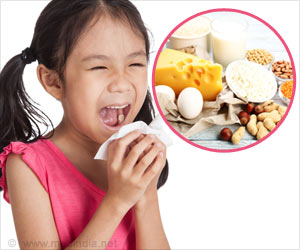A recent study indicates that introduction of allergenic foods to babies as early as three months of age may reduce their chances of developing a food allergy.
Food allergies are increasingly being noted in children. Some of the common causes of food allergy are nuts, eggs, cow’s milk protein and fish. Allergic reactions vary and may include rash, eczema, respiratory symptoms like wheezing, or digestive tract problems like nausea, vomiting or diarrhea. Treatment involves mainly avoiding the allergenic foods. Many children outgrow the allergies as they grow up. Most mothers delay the introduction of possible allergy generating foods to their babies.The study included babies of three months of age who received only breast milk were divided into two groups. One group continued to be on exclusive breastfeeding for another three months, after which their food intake was decided by their parents. In the second group, the babies first underwent a skin-prick allergy test to detect any allergy. Those with a suspected skin reaction underwent a food challenge that included 2 g of the protein of the particular food.
In babies who were not allergic, allergenic foods were started after three months of age. The babies first received yogurt, and then peanut, boiled egg, sesame, and whitefish. Wheat was the last allergenic food to be introduced. Data was obtained till the child was three years of age. A baby allergic to the food challenge was not given that particular food, but was given other foods.
The trial showed a lower risk of allergies in those who were administered a particular amount of allergic foods early. This was especially true for peanuts and eggs, when the babies were administered 2 g of peanut or egg - white protein per week. These results were noted in those babies whose mothers strictly followed the protocol of introducing foods early.
Babies who developed allergies had a significantly higher incidence of eczema at enrollment, were non-whites and had siblings.
An earlier study, Learning About Peanuts (LEAP) research trial, has also indicated that early introduction of peanuts results in lesser children suffering from peanut allergies. Thus, early introduction of allergenic foods could control the increasing problem of food allergies. However, the researchers advise that, based on this study, people should not jump to conclusions and give allergenic foods to their babies, until the results of the study are confirmed by other studies, but should follow the government recommendations in their countries regarding feeding their babies.
References:
- Perkin MR et al for the EAT Study Team. Randomized Trial of Introduction of Allergenic Foods in Breast-Fed Infants. NEJMDOI: 10.1056/NEJMoa1514210
Source-Medindia















